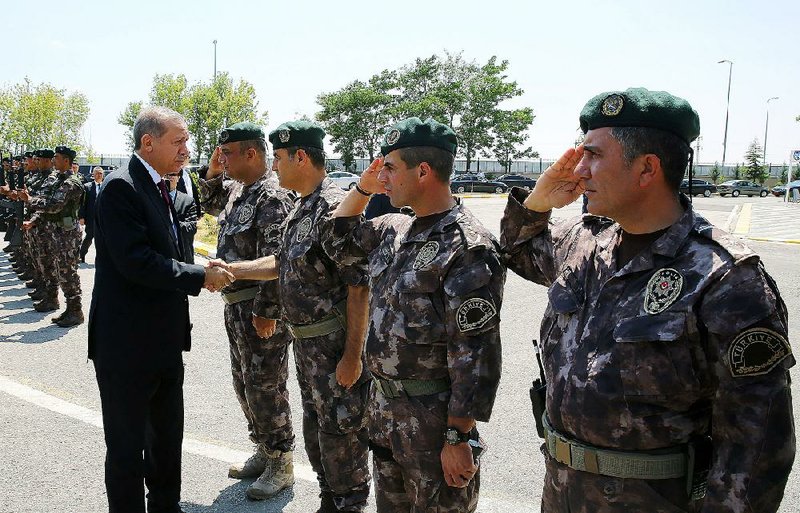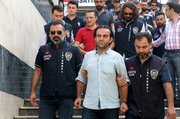A widening purge of Turkish institutions after a failed coup is sweeping up U.S. contacts in the North Atlantic Treaty Organization country and setting back cooperation in counterterrorism efforts, top U.S. intelligence and military officials said.
Political turbulence after the attempted coup against President Recep Tayyip Erdogan and his subsequent crackdown on dissent is "something to be very, very concerned about," Gen. Joseph Votel, the head of U.S. Central Command, said Thursday at the Aspen Security Forum in Colorado. Turkish-U.S. relations have been strained by the coup, which Erdogan blames on a U.S.-based political rival, Fethullah Gulen, whose extradition he is demanding.
Director of National Intelligence James Clapper, also speaking at the annual forum, said, "Many of our interlocutors have been purged or arrested. ... There's no question this is going to set back and make more difficult cooperation with the Turks" when it comes to intelligence, especially in counterterrorism..
Home of NATO's second-biggest military and strategically located between Europe and Asia, Turkey plays a vital role for the coalition battling the Islamic State extremist group in Syria and Iraq. At least 60,000 people have been fired or suspended from the bureaucracy, military, security services, judiciary, Finance Ministry and academia since the failed July 15-16 coup. An additional 1,600 soldiers, including 149 generals and admirals, were dismissed just hours after Erdogan huddled with the chief of the armed forces.
Curtis Scaparrotti, NATO's supreme allied commander for Europe, said he spoke with Hulusi Akar, head of Turkey's military, after the coup attempt. Akar told him the situation is "stressful" but he was "positive," and Akar underscored Turkey's commitment as a "solid ally" to NATO, Scaparrotti said, adding that he intends to visit Akar as soon as he can.
"Some of the officers that we have our relationships with in Turkey are now either detained, in some cases retired as a result of the coup," Scaparrotti said. "We've got some work to do there."
In a late-night news conference Thursday, Erdogan's spokesman Ibrahim Kalin announced that Turkey's military would retain continuity in its top leadership positions after the coup attempt. Akar kept his job as chief of staff, as did the commanders of the three main branches of the military: the army, navy and air force. Thousands of lower-level officers are being replaced, however.
Erdogan, in a separate televised speech outside the headquarters of police special forces in the capital Ankara, also accused Votel of "siding with coup plotters." During the coup attempt, 50 personnel were killed outside the headquarters building.
"One should be ashamed," the president said.
Erdogan didn't mention Votel by name, but it was clear whom he was railing against.
Turkey's defense minister, Fikri Isik, said he'll seek clarity from his U.S. counterpart Ashton Carter on exactly what Votel and Clapper meant by their remarks, which Prime Minister Binaldi Yildirim called a "confession."
While Erdogan has stopped short of directly accusing the Obama administration of fomenting the coup attempt, officials and news outlets are blaming the U.S. with increasing intensity, fueling a surge in anti-Americanism.
"A Confession From a U.S. General: The Coup Plotters Are Our Allies," read the headline in the pro-Erdogan Yeni Safak newspaper, one of several media outlets that interpreted Votel's remarks as an admission of U.S. complicity in the coup attempt.
President Barack Obama last week rejected accusations that the U.S. knew about the coup in advance or supported it. He said he told Erdogan on a phone call that "he needs to make sure that not just he but everybody in his government understand that those reports are completely false, because when rumors like that start swirling around, that puts our people at risk on the ground in Turkey and it threatens what is a critical alliance and partnership between the United States and Turkey."
Gulen, 75, has also rejected any involvement in the attempted coup.
As a NATO partner, it would be common for Turkey's military officers to participate in exchanges with colleagues in the U.S. and Europe and take part in joint exercises and missions. Votel said the coup's aftermath "will have an impact on the operations that we do. I am concerned that it will impact the level of cooperation and collaboration that we have with Turkey."
Lingering "friction" in Turkey is already affecting some of the coalition's current operations, Votel said. He cited the situation at the Incirlik military base in southern Turkey, which hosts about 1,500 U.S. military personnel and aircraft -- as well as European troops -- where power was cut off for several days after the coup.
U.S. operations out of Incirlik were interrupted after the coup but they have since been restored, Pentagon spokesman Peter Cook said.
Information for this article was contributed by Benjamin Harvey of Bloomberg News.
A Section on 07/30/2016

